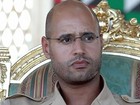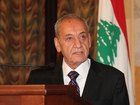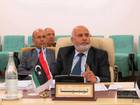A blast on Thursday killed a Libyan military prosecutor in the eastern city of Benghazi who was in charge of cases involving Gadhafi-era regime officials, a security source said.
Yussef Ali al-Asseifar died when a bomb placed under his car exploded, the source told Agence France Presse on condition of anonymity, adding that the prosecutor's brother was also killed in the blast.
 Full Story
Full Story
The case against Seif al-Islam, son of slain Libyan leader Moammar Gadhafi, will be presented to a court in Tripoli on September 19, Libya's public prosecutor announced Tuesday.
"The prosecutor's office has decided to try 30 people linked to the former regime, including Seif al-Islam Gadhafi (and former spy chief) Abdullah al-Senussi," Abdelkader Radouan said.
 Full Story
Full Story
Speaker Nabih Berri considered on Monday that the political and security deterioration in the country must reach an end, pointing out that he will decide if he will propose an initiative to resolve the deadlock in light of the developments.
“I hope that the moving explosions caused the necessary shock that would make everyone revise their stances,” Berri said in comments published in As Safir newspaper.
 Full Story
Full Story
Libyan Prime Minister Ali Zeidan Sunday announced the launch of a national dialogue initiative to tackle issues ranging from national reconciliation to disarmament, as Libya battles a wave of instability.
The country has in recent months been hit by deadly attacks on military and police officers in the east and strikes at its main oil terminals, in some of the worst unrest since dictator Moammar Gadhafi was toppled in October 2011.
 Full Story
Full Story
Gunmen killed a Libyan army colonel in a drive-by shooting on Friday after he left a mosque in the eastern city of Benghazi, a security source told Agence France Presse.
"Unknown gunmen in a car with tinted windows shot and killed Colonel Mustafa al-Aguili," the source said, speaking on condition of anonymity.
 Full Story
Full Story
Bloodbath in Egypt, civil war in Syria, stalemate in Tunisia: the Arab Spring has stoked turmoil because of a lack of maturity among the region's new political class, analysts say.
When popular uprisings swept away long-standing dictators in Egypt, Libya and Tunisia in 2011, hopes were running high for a smooth transition and a fresh start.
 Full Story
Full Story
Four officials placed on administrative leave during a probe into the deadly 2012 attack on the U.S. consulate in Benghazi, Libya, can return to work, the U.S. State Department said Tuesday.
The September 11 attack left four people dead, including ambassador Chris Stevens, and caused a political storm between U.S. President Barack Obama's administration and his Republican opponents.
 Full Story
Full Story
Libya's navy has prevented a tanker from "illegally entering" Al-Sedra oil terminal in the east of the country, the army's general staff said Tuesday, as protests paralyzed several ports.
"Patrol boats from the Libyan navy stopped an oil tanker sailing in Libyan territorial waters from entering Al-Sedra port" on Monday, it said, cited by official news agency LANA.
 Full Story
Full Story
A former judge, aged 79, was gunned down as he left a mosque in the restive eastern city of Benghazi on Monday, a Libyan security services spokesman said.
"Fethi Lekhfifi, a former judge, was shot dead as he came out of a mosque in Benghazi at dawn," said Colonel Abdallah al-Zayedi.
 Full Story
Full Story
Libyan Interior Minister Mohamed Khalifa al-Sheikh tendered his resignation on Sunday, just three months into the job, his spokesman said, as unrest escalates in the North African country.
Sheikh became the second cabinet minister to quit since August 4 when deputy prime minister Awadh al-Barassi stepped down citing the government's inability to contain unrest.
 Full Story
Full Story



